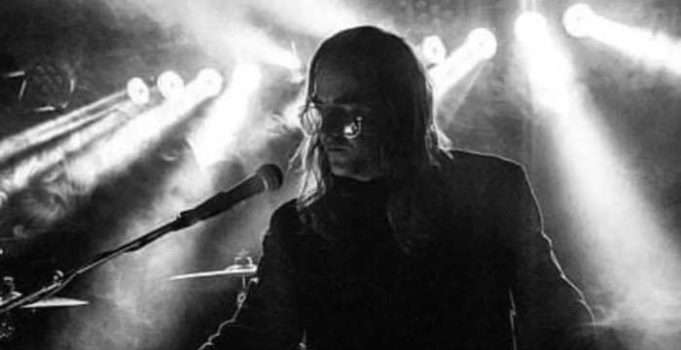The North Texas music community was still reeling from the loss of one unique and creative force within their number with the death of Dooms UK frontman John Freeman last week when word began to spread on Friday of the untimely passing of another beloved figure in the scene. In a Facebook post generated by his partner, Dallas DJ Lisa Adrienne, it was announced that Pinkish Black’s Daron Beck died Thursday afternoon. The extraordinary avant-garde metal singer-songwriter was 48.
No cause of death has been made public. A post from Pinkish Black’s label, Relapse Records, mentioned his passing as being caused by a “medical illness,” and in her post, Adrienne described it as “sudden and unexpected” while alluding to a return of medical issues he’d previously suffered yet had seemingly recovered from. Beck survived a pair of heart attacks in 2018, and he mentioned at the time that heart disease runs in his family. The scare forced a significant lifestyle change for him. He gave up alcohol and smoking, and in recent years it appeared that his health had improved.
Ultimately, the cause is irrelevant. No matter why, it’s a tragedy that it’s happened, and there is now a large and empty blank in the giant space he had occupied in the Fort Worth music community for the last two decades.
Whether fronting goth-wavers Pointy Shoe Factory, the nightmare circus soundtrack that was The Great Tyrant, the skull-crushing synth-doom of Pinkish Black, or, ultimately, the smooth-knob-turned-all-the-way-up homage to ’70s chart-toppers Zombi and Friends, there is no argument that Beck both possessed, and was, a singular voice. His resonant baritone was every bit as elegant as it was chilling, lending a haunting beauty to all of the numerous projects he contributed to. The musical oeuvre he pioneered — part buzzsaw industrial crash, part Italian horror movie score, and part foreboding sludge-metal, all topped with a sensuous Scott Walker croon — was as unique a sound as he was a person.
I first became personally aware of Beck in the early 2000s. I had a little postrock band at the time that had the misfortune to practice next door to The Great Tyrant at the old EMP Rehearsal Studios off Berry Street. Tyrant was the initial incarnation in Beck’s musical lineage that led to Pinkish Black after the suicide of bassist Tommy Atkins in 2010. I say “misfortune” only because our quiet little chiming and reverb-drenched Godspeed You! Black Emperor cosplay was no match for the thunderous torment coming at us through the walls when the Tyrant was playing. If they were practicing, it was pretty much time to wrap it up for the night. We heard countless deafening hours of Atkins’ and drummer John Teague’s Zeus-ian rhythm section pounding away beneath Beck’s haunted calliope synth lines and canonical droning voice. It seemed as if a disembodied druid was calling to us from the other side of the sheetrock to follow him to some ancient and dark séance. The Great Tyrant, like Pinkish Black after, was terrifying, super-weird, and super-awesome.
We would occasionally see them in the hallways, or outside the building smoking cigs, and though he’d smile and give a nod, to us, Beck just seemed too otherworldly and cool to speak to. If I’d known then, what I know now — which is that despite the steady brooding through-point of his music, he was an infinitely approachable and nice guy (as well as genuinely hilarious) — I would have made a point to try to become his friend. I would be grateful to have been able to add those years to the last few, when I feel like I could just maybe say that I was.
I wrote a piece about several of his current musical ventures, including the breathtaking solid gold covers sendup Zombi and Friends in 2021, and I was instantly charmed by his wit and self-deprecating sense of humor. Perhaps nothing encapsulates this more than Beck’s unwitting appearance on Season 4 of American Idol. As it so happened, another contribution mentioned in the article was the vocal performance he contributed to “Miles and Miles,” a track on my band O. Deletron’s swansong record. It stands as my favorite among the dozen or so guest vocal appearances we were able to rally for that album. Over the course of our conversation, I’d like to think we hit it off over a mutual obsession with Michael McDonald and Christopher Cross. Most of the music he made might be fairly described as dark and spooky, but make no mistake: Beck’s true musical heart — and mine — lies with the soft rock of the 1970s and ’80s. He had just gone to the Barry Manilow concert at Dickies Arena this past Wednesday.
Since the tragic announcement, my social media feed has been flooded with posts expressing all the love and appreciation for the artist and the person that he was that this community has for him. Dark as you could say his music (and perhaps his sense of humor) was, there is no denying how brightly he shined as a person. Rest in peace, Daron.












